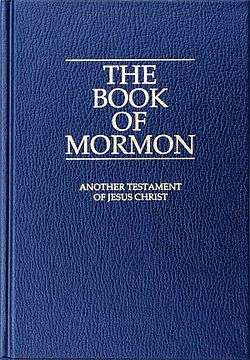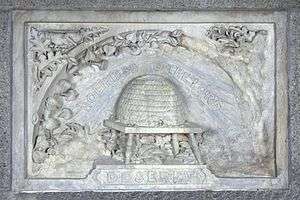Ether (Book of Mormon prophet)
| Part of a series on the |
| Book of Mormon |
|---|
 |
| Origin |
| Prophets and people |
| Historical authenticity and criticism |
|
|
According to the Book of Mormon, Ether (/ˈiː.θɜːr/[1]) is a Jaredite prophet, one of the last surviving Jaredites, and primary author of the Book of Ether.
Etymology
According to Hugh W. Nibley, the name "Ether" (Ether 1:6), athira, means "the one who left a trace, the one who left his mark or left a record." In all Semitic languages it is the same, and it means "to leave a track, to trail somebody."[2]
Lineage
| Moron | (unnamed) | ||||||||||||||||||||||
| Coriantor | (unnamed) | ||||||||||||||||||||||
| Ether | |||||||||||||||||||||||
Life
Ether's grandfather Moron, had been king of the Jaredites. Moron was overthrown and "dwelt in captivity all the remainder of his days".[3] Ether's father, Coriantor, was born while his father was captive and Coriantor "dwelt in captivity all his days".[4] Ether "was a prophet of the Lord"[5] and "lived in the days of Coriantumr; and Coriantumr was king over all the land".[6] The people rejected his teachings concerning a "New Jerusalem",[7] causing him to hide in a cave, where he witnessed the destruction of the Jaredites.[8] Ether was compelled to preach to Coriantumr, who also rejected his word. After sealing up the records, Ether's final words were, "Whether the Lord will that I be translated, or that I suffer the will of the Lord in the flesh, it mattereth not, if it so be that I am saved in the kingdom of God. Amen."[9]
Praise
Monte J. Brough said the following about him: "Ether, as my personal mentor of some years, has helped me understand how hope, which 'cometh of faith, maketh an anchor' to my soul. It is this hope for a better world that is the foundation of the great plan of happiness. This profound hope...is part of the process of bringing stability into our lives."[10]:193
"In facing tragedy, it is instructional to observe those who have complete and total faith in the reality of the mansions of our Father. This faith does result in a testimony of Jesus Christ and the process of the Atonement. 'Man must hope, or he cannot receive' the blessing of the great plan of happiness, which provides peace and understanding for mortal mankind. It is this 'more excellent hope' that allows us to accept whatever trial or test comes to us. As each of us faces personal tragedy, we can have a much better acceptance of the final results because of the prophet Ether's example."[10]:194–5
Teachings

Polygamy
According to Daniel H. Ludlow, it is not clear, however, whether or not the Jaredites were commanded by the Lord to practice polygamy. The following evidences have been cited which might indicate that they did practice polygamy:[11]
- Many of the men had large numbers of sons and daughters. For example, the brother of Jared had 22 sons and daughters (Ether 6:20) and Orihah had 31 sons and daughters (Ether 7:2).
- Riplakish had "many wives and concubines" (Ether 10:5). He was condemned by the Lord for his wickedness, but it is not clear whether or not this condemnation was because of his "many wives."
- In Ether 14:2 it states that "every man kept the hilt of his sword in his right hand, in the defence of his property and his own life and of his wives and children." This verse seems to indicate that the people practiced polygamy, but whether or not it was sanctioned by the Lord is not made clear in the record.
Cycle of Righteousness
Ether 9:15-35 shows a pattern repeated many times in the Book of Mormon:[12]
- During the righteous reigns of Emer and Coriantum the people prospered exceedingly (v. 15-25)
- Under the reign of Heth, the people began to join together in secret combinations, and they turned to wickedness (v. 26-27)
- The Lord sent prophets to warn the people of their terrible circumstances (v. 28)
- The people of Heth rejected the prophets (v. 29)
- The judgments of God fell upon the people (v. 30-33)
- The people humbled themselves and repented and the Lord blessed them again with prosperity (v. 34-35)
The Jaredites were able to be wealthy and remain righteous for more than 100 years (see v. 15-25).[12]
Secret Combinations
In Ether 8:18-22 we learn four important things concerning secret combinations:[12]
- Secret combinations are wicked and forbidden of the Lord (v. 18-19)
- Secret combinations are "had among all people" (v. 20)
- Secret combinations "caused the destruction" of both the Jaredite and Nephite nations (v. 21)
- Whatever nation upholds secret combinations "shall be destroyed" (v. 22)
New Jerusalem
In Ether 13:1-12 we learn about a New Jerusalem:[13]
- It will be "the holy sanctuary of the Lord" (Ether 13:3)
- It will be built on the American continent for the remnant of the seed of Joseph (v. 4–6)
- It will be a holy city like the Jerusalem built unto the Lord (v. 8–9)
- It will stand until the earth is celestialized (v. 8)
- It will be a city for the pure and righteous (v. 10)
Comparison with Moroni
The last prophet called of God to warn the Jaredite nation and to witness against them was Ether, the son of Coriantor.[13] H. Donl Peterson notes that Moroni could have empathized with Ether, since both were prophets of God sent to preach to a people who were "past feeling" and who "did reject all the words of the prophets" (Ether 11:23). Both men were the last of their once great civilizations, and both were called upon to record their final struggles and then were charged to be responsible for preserving the precious records of their fallen people.[14]
See also
- List of Book of Mormon prophets
- Mahonri Moriancumer, the brother of Jared
References
- ↑ LDS.org: "Book of Mormon Pronunciation Guide" (retrieved 2012-02-25), IPA-ified from «ē´ther»
- ↑ Nibley, Hugh W. (1993), "Lecture 109: Ether 1–2, The Epic Literature of the Book of Ether", Teachings of the Book of Mormon, Semester 4, Provo, Utah: Foundation for Ancient Research and Mormon Studies, p. 243, ISBN 159156574X, OCLC 67231983
- ↑ Ether 11:18
- ↑ Ether 11:23
- ↑ Ether 12:2
- ↑ Ether 12:1
- ↑ Ether 13:2-6
- ↑ Ether 13:15-16
- ↑ Ether 15:33-34
- 1 2 Brough, Monte J. (1995). "The Prophet Ether: man of the more excellent hope". Heroes From the Book of Mormon. Salt Lake City, Utah: Bookcraft. ISBN 0884949966. LCCN 95079967. OCLC 33921262.
- ↑ Ludlow, Daniel H. (1976), A Companion to Your Study of the Book of Mormon, Salt Lake City: Deseret Book, p. 327, ISBN 0877476101, LCCN 76027139, OCLC 2524485
- 1 2 3 LDS Church (2009). "Chapter 51: Ether 6–10". Book of Mormon Student Manual: Religion 121-122 (PDF). Institutes of Religion, Church Educational System, LDS Church. OCLC 469723743.
- 1 2 LDS Church (2009). "Chapter 52: Ether 11-15". Book of Mormon Student Manual: Religion 121-122 (PDF). Institutes of Religion, Church Educational System, LDS Church. OCLC 469723743.
- ↑ Peterson, H. Donl (2007) [1983]. Moroni: Ancient Prophet Modern Messenger. Springville, Utah: Cedar Fort Inc (CFI). p. 47. ISBN 9781599551418. LCCN 2007052168. OCLC 185056590.
Further reading
- Donaldson, Lee L. (1995). "The Plates of Ether and the Covenant of the Book of Mormon". In Nyman, Monte S.; Tate, Charles D., Jr. Fourth Nephi, From Zion to Destruction. Provo, Utah: Religious Studies Center, Brigham Young University. pp. 69–79. ISBN 0884949745. OCLC 32500560.
- LeBaron, E. Dale (1995). "Ether and Mormon: Parallel Prophets of Warning and Witness". In Nyman, Monte S.; Tate, Charles D., Jr. Fourth Nephi, From Zion to Destruction. Provo, Utah: Religious Studies Center, Brigham Young University. pp. 153–65. ISBN 0884949745. OCLC 32500560.
- Maxwell, Neal A. (August 1978). "Three Jaredites: Contrasting Contemporaries". Ensign.
External links
| Wikisource has original text related to this article: |